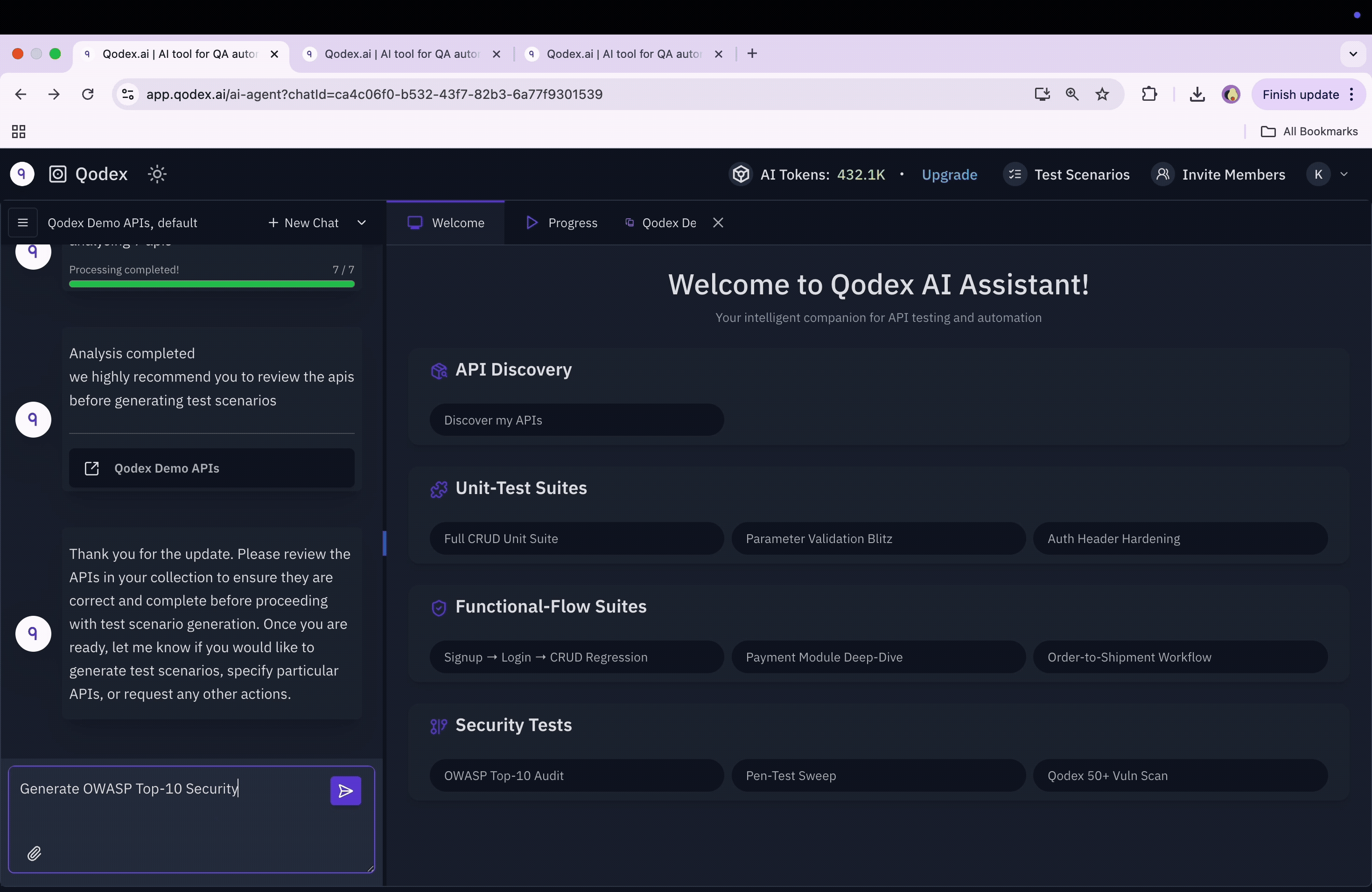Skip to main content Instead of spending days writing test scripts, handling broken assertions, or updating tests with every change. Qodex takes care of it all. From test creation to execution to healing, just write what you want in plain English. Qodex does the rest.
Instead of spending days writing test scripts, handling broken assertions, or updating tests with every change. Qodex takes care of it all. From test creation to execution to healing, just write what you want in plain English. Qodex does the rest.
Key Capabilities
-
AI Test Scenario Creation
Just describe your use case. Qodex auto-generates modular, chained, end-to-end test flows across APIs—from login to payment to edge cases.
-
Test Data + Rules (AI + Manual)
Request data and assertions are auto-suggested. Want custom rules? Write them in English - Qodex converts it into JavaScript for you.
-
Auto-Healing
When your APIs change and tests break, Qodex compares with the last successful build, pinpoints changes, and suggests one-click fixes. No manual debugging.
-
Security Testing
Run OWASP Top 10, penetration, and custom threat-model-based security tests across your APIs with a single command.
-
Run Anywhere
Run tests from the UI, CLI, or CI/CD pipeline. Schedule runs with Test Plans or execute specific scenarios on the fly.
-
GitHub Sync
Your test suite lives in your GitHub repo. Clone it. Modify it. Run pre-commit validations. Your devs never wait on QA.
-
Database Validations
Connect your staging DB (read-only access) and validate business logic directly, e.g., “user should exist in DB with status ‘active’”.
Developer Workflow
-
Upload a Postman/Swagger collection
-
Write a prompt in plain English
→ “Write end-to-end user onboarding tests”
-
Review AI-generated test scenarios
-
Approve → Qodex auto-generates test cases, data, rules
-
Run tests (UI, CLI, or CI)
-
Fix failing tests with 1-click auto-heal
-
Sync everything to GitHub
👉 Try it out now!
FAQs
Qodex supports:
-
Postman collections (v2.1+)
-
Swagger/OpenAPI specifications
-
SDK-generated OpenAPI files
If you don’t have these, Qodex can help you generate them.
2. Do I need to know how to write test scripts?
No. Just write what you want to test in plain English.
Example:
“Write a negative test for user registration with invalid email”
Qodex generates the test steps, data, and rules.
3. How does auto-healing work?
Qodex compares the last successful test run with the current failing one:
-
Detects response structure changes
-
Flags outdated or contradicting rules
-
Suggests fix recommendations
You can apply the fix with one click.
4. Can I still write custom tests manually?
Absolutely. You can:
-
Create manual test scenarios
-
Write rules in English or JavaScript
-
Chain test steps across APIs
AI and manual flows work seamlessly together.
5. What kind of security tests are available?
Out-of-the-box:
-
OWASP Top 10
-
Penetration testing
-
Header misconfig checks
-
Rate limit abuse
-
Injection tests
You can also define custom threats using plain text prompts.
6. Can Qodex run in my CI/CD pipeline?
Yes. You can:
-
Trigger builds via CLI
-
Use GitHub Actions or custom scripts
-
Set up pre-commit or post-deploy validation
Qodex supports environments like staging, dev, QA, and local runs.
7. How is pricing structured?
Pricing is usage-based:
-
AI token consumption (only during generation/update)
-
Unlimited test executions
-
Pay-as-you-scale
Trial accounts start with 500,000 tokens.
8. How does GitHub sync work?
Every test is code.
Qodex syncs your entire test suite to a GitHub repo (private by default).
You can:
- Clone
- Edit test files
- Run tests pre-commit
- Collaborate with devs directly
9. What if my APIs need cookies, tokens, or OTPs?
We support:
- Cookie injection
- Custom JS functions (e.g., OTP fetchers)
- Post-response scripting
- Partial response parsing for auth flows
10. Can I validate responses against my database?
Yes.
Grant read-only access to your staging DB (via VPC peering or direct URI).
Qodex will:
- Read your schema
- Generate SQL queries
- Match API responses to expected DB state
